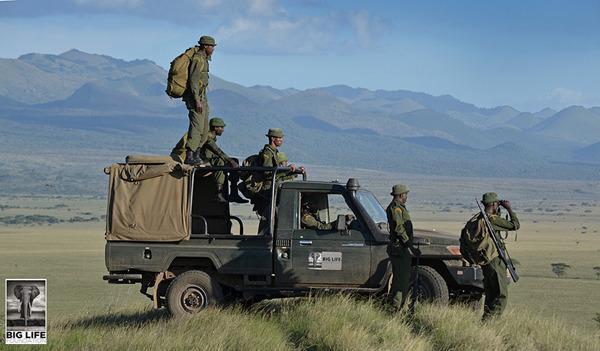
In the escalating war against poaching, there will be battles that we lose, and battles we can win.
So far, in the three and half years of Big Life’s existence, our 315 rangers, spread across 2 million acres of Kenyan and Tanzanian wilderness, have done an incredibly effective job at dramatically reducing poaching in the region.
But in the areas immediately outside the areas that we protect, the animals are still being killed at an alarming rate.
We always said that our projects would stay within their means, so that our protection of the ecosystem was as good as it could be.
Last year, thanks to donors like you, we achieved our 2013 budget. It was a huge relief. Now, in the hopes that with your help, we make it again, we have a special further request to ask of all of you.
It’s hard, so hard, to turn away from the animals being slaughtered just outside the range of our protection. In Northern Tanzania, we have seen the mobile rapid response team, composed of the best rangers, be very effective, because even though the vehicle is covering a large area, its mere potential presence is a strong deterrent to poachers on foot, as they never know whether the vehicle is in the area.
We look at these still-unprotected areas, and we cannot help but think - how many lives could we save if we expanded and created one elite mobile team that covers these? All told, we are looking at protecting another 650,000 acres.
Up until now on the Kenyan side, our method has been to move into areas by creating permanent ranger camps in areas in which wildlife security is most needed. This method is working well, with poaching of all forms significantly decreased from pre-2011 levels.
But a single Mobile Rapid Response Team, fully equipped, and manned with the best rangers in Big Life, setting up camp in a different place each night, would greatly increase wildlife security.
Bluntly put, it will save lives.
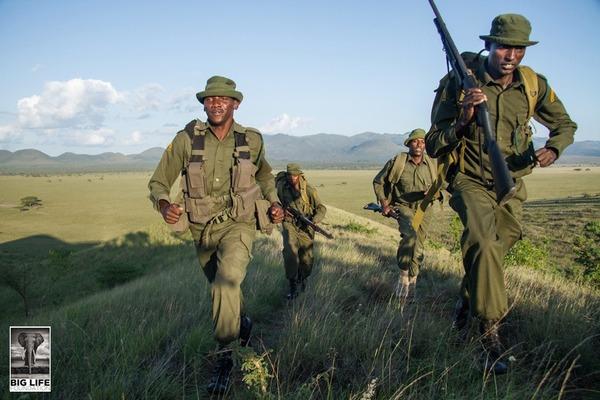
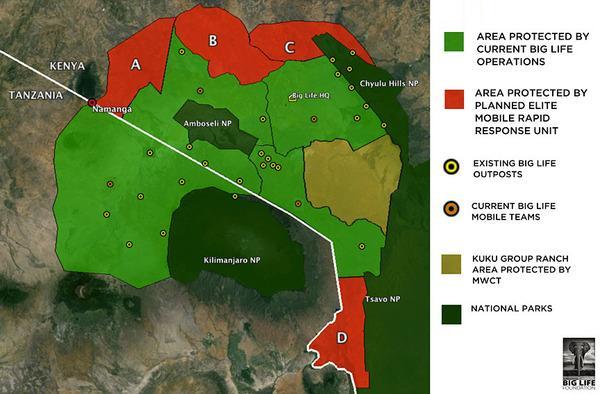
When you look at the map above, you’ll see the areas that Big Life currently patrols are in green. Amboseli, Chyulus, Kilimanjaro and Tsavo National Parks are the areas in dark green.
The NEW areas that the Rapid Response Unit would cover are the four red blocks: A, B, C & D.
The most critical area currently is Block D: Lake Jipe / Taveta, an area totaling 150,000 acres. Elephant poaching is the worst here, partly because it is used as an access and escape route to and from Tsavo West National Park. Bush meat poaching is also completely out of control here.
With a poacher recently arrested by Big Life’s Rombo team confessing to killing 17 elephants in Tsavo in the last few years, the Kenya Wildlife Service have constantly requested Big Life extend its cover into the area bordering Tsavo West and Tanzania. This is a well known corridor used by poachers, and it is only getting worse. A mobile team working with KWS will have a huge effect on this corridor.
Blocks A, B and C to the north and west, totaling 500,000 acres, is increasingly a dispersal area for Amboseli’s elephants, thanks to the increased protection for them within Big Life’s current inner (green) region.
Also, once again, the entire area is experiencing severe bush meat poaching, especially around the border town of Namanga, a center point for the bush meat trade. Informers in nearby areas regularly report poaching by night using spotlights on both sides of the border.
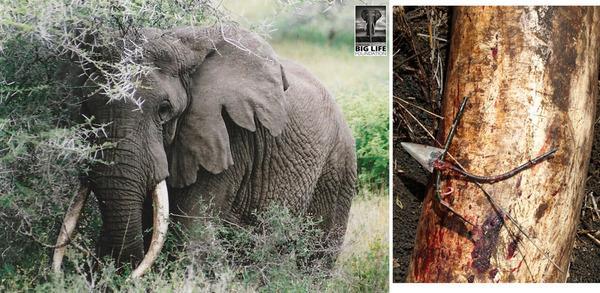
It was in Block C that one of the Chyulus’ most iconic bull elephants, Torn Ear (above), was killed in February, a victim of poachers’ poison spears. Perhaps with the Rapid Response Team in the area, we could have saved him. Even if the Team is in another block, the deterrent will be there - as poachers will be aware that the team response will be fast.
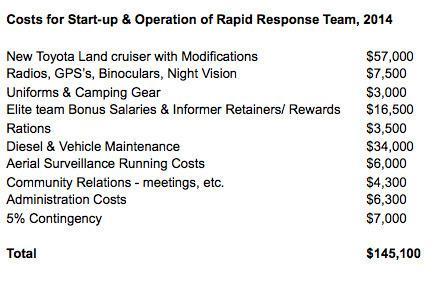
So will you help us expand our area of protection into these new areas?
If you were planning on making a donation to Big Life for 2014, could you make an extra donation towards the Rapid Response Team? If we hit our target of $145,100 between Big Life US and Big Life Canada, we will be so grateful to you all for enabling this.
To give, please go to www.biglife.org/donations
Thank you
Nick Brandt & Richard Bonham
RELATED LINKS:
Big Life News/“THREE MEN, ONE GUN, HEADING FOR TSAVO NATIONAL PARK”
Wildlife Protection/Long Term Solutions
Wildlife Protection/Anti-Poaching
